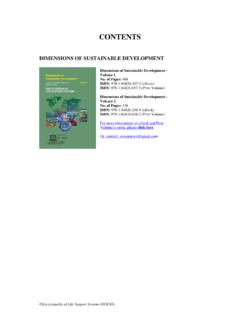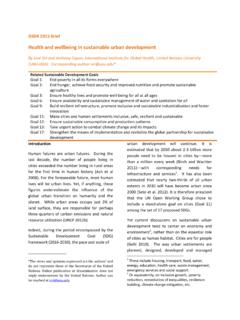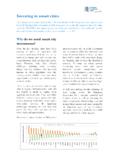Transcription of GREEN CITIES PROGRAMME - OECD.org
1 GREEN CITIES PROGRAMME . PROGRAMME PURPOSE. The OECD has launched a PROGRAMME on GREEN CITIES to assess how urban GREEN growth and sustainability policies can contribute to improve the economic performance and environmental quality of metropolitan areas and thus enhance the contribution of urban areas to national growth, quality of life and competitiveness. This PROGRAMME responds the 2010 OECD Urban Roundtable of Mayors and Ministers on CITIES and GREEN Growth, where mayors and ministers from 21 CITIES and 34 countries called for an evaluation of GREEN growth policies to determine policy best practices. While a growing number of studies seek to characterise sustainable and GREEN CITIES , they do not provide an assessment across multiple CITIES of the impact of these policies on jobs growth, economic attractiveness and environmental quality. The OECD GREEN CITIES PROGRAMME responds to this information gap by assessing the impact of urban sustainability and GREEN growth policies on urban and national performance through case studies in key OECD.
2 And non-OECD CITIES , across a range of geographical, economic and national regulatory contexts. PROGAMME ELEMENTS: CASE STUDIES, INDICATORS AND COMPARATIVE REPORT. The PROGRAMME has four main elements: 1. Development of a concept paper to provide the conceptual framework and methodology for the case studies. 2. Case studies of select CITIES to assess policy impacts. 3. Development of environmental quality indicators in the OECD Metropolitan Regional Database to establish the baseline environmental quality and economic performance of case study CITIES . 4. Comparative report analysing case studies and performance indicators to identify best practices These elements will be supported by the establishment of a network of technical experts and city representatives to review and provide guidance at each stage of the PROGRAMME . Conceptual framework: Why focus on GREEN growth in CITIES ? The OECD GREEN CITIES PROGRAMME complements the OECD's horizontal work on GREEN growth, which Ministers of Economy, Finance, Trade and Foreign Affairs from 34 countries initiated in the OECD.
3 Declaration on GREEN Growth in June 2009. GREEN growth is emerging as a new paradigm that promotes economic development while reducing greenhouse gas emissions and pollution, minimising waste and inefficient use of natural resources and maintaining biodiversity. GREEN growth implies increases in public and private investments and consumption that lead to sustainable resource use, lower greenhouse gas emissions, and reduced vulnerability to climate change. GREEN growth also recognizes that environmental policies that do not also support economic growth and wealth generation are not sustainable in the long term. In other words, the paradigm posits that GREEN and growth is not an either/or proposition; on the contrary, sustainability and economic growth are mutually reinforcing objectives to be pursued in an integrated and coherent manner. To be sustainable, GREEN growth strategies must also incorporate social equity concerns. Certain urban populations, such as poor or elderly residents, are often more vulnerable to climate change impacts.
4 Moreover, 1. strategies to reduce greenhouse gas emissions can exacerbate urban inequalities: a transportation tax, for instance, can further burden poor households who cannot afford housing the city centre. Successful GREEN growth strategies call for a better understanding of the social consequences of the transition to a GREEN economy. From the urban perspective, GREEN growth represents a fundamental increase in demand for environmental quality, which includes two elements: 1. Demand for environmental quality of life improvements ( , clean air and open space). 2. Demand for products and services that reduce pressures on the environment ( energy efficiency technologies, public transport). CITIES pose clear economic advantages in responding to this demand and fostering private-sector responses. They are well positioned to develop innovative policy solutions that can be scaled up into regional or national programmes, and to provide a laboratory for national pilot programmes on the urban level.
5 In addition, they are promising testing grounds for GREEN technology development, such as electric cars and electric car rental schemes. CITIES are magnets for highly skilled people and advanced firms, and they are responsible for developing infrastructure and the built environment, as well as providing waste, water and transport services. OECD work on CITIES and climate change demonstrates that urban policies increasing density, charging drivers more during peak travel times reduce national greenhouse gas emissions while supporting economic growth in the long term. Synergy between environmental and economic policies is stronger at the urban level, particularly in the sectors of transportation, building and energy. Congestion, pollution and public services constraints affect not just environmental quality but also the efficiency of CITIES '. economic activities and their ability to attract firms and skilled workers. Policies that reduce energy, resource consumption and waste, and increase the attractiveness of the urban environment can therefore also support urban economic growth.
6 Efforts to pursue urban GREEN growth face several challenges, however, including how to make these efforts broader, more systematic and more long-term, as well as how to ensure integration and co-ordination between local and national initiatives. Equity concerns must also be addressed to ensure that GREEN growth policies do not generate or exacerbate social inequalities and, in some cases, may yield a more equitable distribution of environmental and economic benefits. Developing GREEN growth strategies at the city scale is not an easy task. Now more than ever, funding is an issue as CITIES face demands of employment generation and service provision with fewer resources. The GREEN CITIES PROGRAMME will provide recommendations on policies and institutional reforms to address these challenges in each case study city and also identify best practices across CITIES . The OECD will develop a concept paper for the GREEN CITIES PROGRAMME , which will elaborate the conceptual framework for urban GREEN growth and assess the relationships between economic performance and environmental quality in the short and long-term.
7 The conceptual framework will take the form of a draft concept paper, including a literature review, as well as a preliminary set of policy interventions and measures that will be applied to each case study to compare existing initiatives and monitor their impact in terms of job creation, environmental improvement and regional economic growth. The paper will inform the OECD GREEN Growth Strategy to be released by June 2011 and will be used as a framework of analysis for the city case studies. 2. Case studies of CITIES to assess policy impacts At the centre of the OECD GREEN CITIES PROGRAMME is a series of case studies of OECD and non- OECD CITIES to assess the impact of urban GREEN growth and sustainability policies on CITIES ' economic performance and environmental quality. These case studies aim to represent a range of geographical, economic and national regulatory contexts. CITIES will be selected based on their experience in developing and implementing sustainable urban development and GREEN growth initiatives.
8 The case studies will include the following main elements: Review of policy interventions pursued by the city/metro region that fall within the following categories: Policies to improve urban quality and services ( urban revitalisation, enhancing public transport, reducing vehicle emissions, access to open space, improving water and wastewater services). Policies to reduce environmental resource consumption ( increasing the energy efficiency of production and buildings, increasing share of energy from renewable sources, limiting urban sprawl, reducing waste disposed of in landfills). Policies to enable the supply of environmental technologies and services ( business support services for GREEN technology firms, lowering barriers to consumption of GREEN tech, enhancing R&D linkages between universities and local GREEN firms). Institutional and financial opportunities and barriers for policy implementation will be identified, with particular attention paid to multi-level governance issues and public-private partnerships for GREEN growth projects.
9 Assessment of policy impacts based on a review of available data measuring: Local jobs creation and skill level Transport Attraction of firms Climate change/energy Regional innovation Environmental health Land use Awareness and behaviour Air, water and waste Participation of representatives from the city in a network of experts that will include OECD. experts, academics, and representatives of other benchmark CITIES and the private sector to exchange experiences and views on policy issues related to sustainable urban development. Participation of high-level politicians from the city in the annual meeting of the OECD Roundtable of Mayors and Ministers, to be held Q3 2011 and Q3 2012, to contribute to the discussion of best practices and highlight the progress of their city's case study. The case studies will be published separately as stand-alone reports, and will also be integrated into the OECD Comparative Analysis of GREEN CITIES . 3. Please see Annex 1 for details on the timeline and financing for the case studies.
10 Environmental indicators for OECD Metropolitan areas Environmental quality indicators are an important subset of the above categories of indicators. The OECD is currently working on defining metropolitan and urban areas in member countries so as to enable cross-country comparisons of urban sustainability trends, including indicators of urban sprawl, change in land-use, indicators of transport use and travel time, and indicators of urban emissions and air quality. The OECD PROGRAMME on GREEN CITIES will make use of these metropolitan environmental quality indicators, and also collect additional environmental quality data in each of the case studies CITIES , as available, on: impact on quality and extent of urban services ( quality of and access to transportation, open space and public services), local environmental quality ( air, water, and waste generation), and local resource consumption ( residential, industrial and transport energy consumption, water use, and extent of built environment).


















